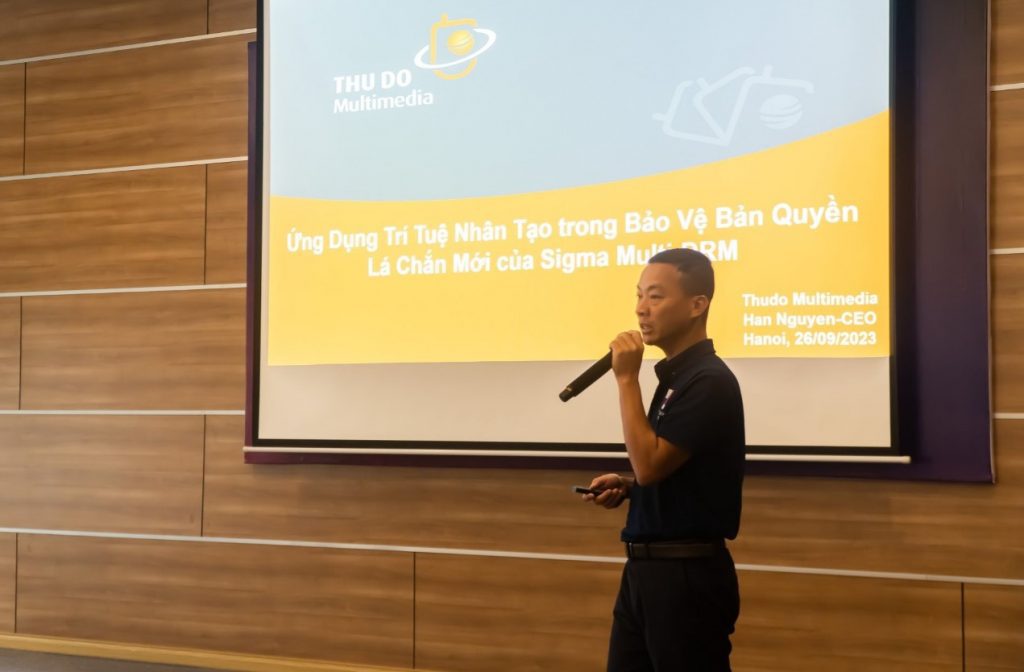Approximately 1,000 copyright-infringing football websites have been blocked within a year, but the issue persists, according to the Radio, Television, and Electronic Information Department.
During a copyright protection seminar for the music, film, and digital television industry on September 26th in Hanoi, Mr. Pham Hoang Hai, Director of the Center for Digital Content Copyright, Radio, Television, and Electronic Information Department under the Ministry of Information and Communications, stated that copyright violations are becoming increasingly complex, encompassing football, films, and more recently, Japanese anime content.
In the field of football alone, there are approximately 70 pirate websites, with 5 leading groups like “xoilac” and “cakhia,” each with various website addresses. During the 2022-2023 season, these groups’ websites reached 7.7 million users and 1.5 billion views according to Similarweb statistics. Pirate films have over 200 websites, attracting 120 million monthly views.
According to Mr. Hai, these websites commonly use international domains and hide their information. In addition to streaming content, they display harmful advertisements and engage in gambling. When blocked, these websites frequently change domain names. Between August 2022 and August 2023, Vietnamese authorities blocked nearly 1,000 pirate football websites.

Photo: Luu Quy
One pirate streaming site showed World Cup 2022 matches along with gambling advertisements. At the seminar, Ms. Pham Thanh Thuy, in charge of copyright enforcement for K+ television, cited data from Media Partners Asia indicating that Vietnam is among the top three countries in the region with the highest number of copyright violations, with 15.5 million regular users accessing pirate websites. When adjusted for population, Vietnam leads Southeast Asia in this regard. Ms. Thuy noted that copyright violations used to occur on TV boxes with pre-installed pirate viewing applications, but now the majority occur on digital platforms like websites and social media.

Mr. Nguyen Ngoc Han, CEO of Thudomultimedia, pointed out that as social media and OTT platforms develop, protecting copyrights becomes more challenging, as approximately 80% of violations take place on digital platforms. Pirate groups may be based in Vietnam but use VPN software to disguise their location and provide content to Vietnamese users, affecting the revenue and reputation of locally licensed services. It is estimated that copyright infringement cost Vietnam around $350 million in damages in 2022.
To combat these issues, the Center for Digital Content Copyright is working with Vietnamese internet service providers (ISPs) to block access to pirated websites. This approach has resulted in a 98% reduction in visits to pirate football websites during the past season. Additionally, it has influenced user behavior. According to a CAP survey, 23% of users indicated they would not access similar content if it was blocked, and 60% sought legitimate free alternatives.
However, Mr. Hai noted that there is still inconsistency among ISPs regarding the enforcement of blocking measures. Some ISPs block immediately, while others take up to three days, which can undermine the effectiveness of the effort.
Ms. Thuy mentioned that various technical and legal measures have been applied but continue to face challenges. For instance, when filing complaints about violations with the administrative authorities, they require evidence and proof of damages. Many cases, such as the Phimmoi website, take years to resolve.
One proposed solution by Ms. Thuy is “Knock and Talk,” a successful approach in other countries. In this method, a professional investigative team identifies all contacts to obtain information about the website owner and subsequently approaches them to request a commitment to stop copyright infringement. According to Ms. Thuy, this approach could yield long-term effectiveness and take a few months to process.
In early September, the Ministry of Information and Communications announced plans to collaborate with the Ministry of Public Security to address the issue of pirated content websites and stated that they would not limit themselves to administrative penalties. Furthermore, they suggested that the issue could also be resolved through user behavior, as support for pirate websites ultimately harms content copyright businesses, making it difficult for them to obtain licenses and develop content. In such cases, consumers would ultimately bear the brunt of the consequences.


Recent Comments